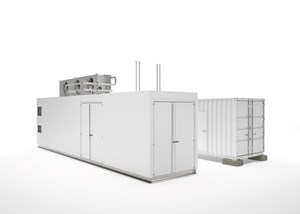News
Asahi Kasei to supply 1-MW-class alkaline-water electrolyzer to H2 project
Diversified global manufacturer Asahi Kasei will supply its Aqualyzer™-C3 containerized 1-MW-class alkaline water electrolyzer to the Central Finland Mobility Foundation (Cefmof). The system will play an essential role in Central Finland’s H2 production and contribute to the region’s decarbonization efforts. Full operation is expected to begin in the first half of 2026.
Having launched its chlor-alkali electrolysis business in 1975, Asahi Kasei leveraged its technology and expertise to develop water electrolysis systems for H2 production. In 2020, the company installed its large-scale 10 MW-class Aqualyzer electrolyzer at the Fukushima H2 Energy Research Field (FH2R) in Namie, Futaba, Fukushima, Japan. Following the success of the FH2R project, Aqualyzer-C3 was added to its portfolio in 2024 as a small-scale, containerized system in the range of 1 to 7.5 MW. This allows Asahi Kasei to meet emerging diversified needs of customers across the entire H2 market, with significant growth expected.
Cefmof is a foundation that accelerates the development of sustainable mobility and urban planning by harnessing green H2 — particularly in ways that are tangible and visible in people’s everyday lives. It was established by the City of Jyväskylä, TOYOTA GAZOO Racing World Rally Team, and the Toyota Mobility Foundation. The foundation supports projects such as H2-powered transport and related infrastructure. Cefmof plans to use fuel cell vehicles and H2 buses, serving as a case model for the potential of H2 utilization in cold climates and the mobility industry.
Easy scalability to meet growing demand. For the reliable and efficient supply of H2, Cefmof chose Asahi Kasei’s container-type Aqualyzer-C3 with a capacity of 1 MW. The installation in Jyväskylä is expected to commence towards the end of 2025, aiming for full-scale operation in the first half of 2026. The system will be able to produce enough H2 in an hour to refill approximately three fuel cell vehicles (FCVs).
The containerized modular design allows for gradual expansion of production capacity through the connection of additional units, allowing for flexibility in meeting future increases in H2 demand.
“With this project, our H2-related business has moved fully into the commercialization phase,” noted Kenji Takeda, Executive Officer of Asahi Kasei responsible for Business Development of its Green Solution Project. “We will work with our partners to demonstrate the reliability of our alkaline water electrolysis system through installation in extreme cold-climate environments and contribute to the decarbonization of the Central Finland region. We are proud to be a one-stop supplier providing support from installation to H2 production operations.”
“This project will be a key part of the emerging green H2 ecosystem in Central Finland and highlights Cefmof’s long-term commitment to building a carbon neutral future in the region,” said Haruka Arai, Executive Director of Cefmof. “This development supports the practical realization of a functioning H2 refueling infrastructure in Jyväskylä.”


